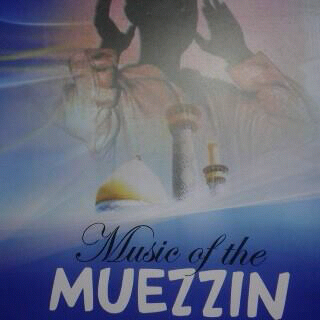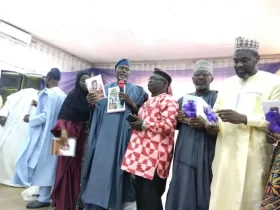SENSE AND SOUND FOR THE SEASON: A REVIEW OF ADEBAYO LAWAL’S MUSIC OF THE MUEZZIN
Title: Music of the Muezzin
Author: R. Adebayo Lawal
Publisher: Kraftgriots
Year of Publication: 2014
Pages: 60
Reviewer: Mahfouz A. Adedimeji
The quest for rectitude has been a foremost preoccupation of thinkers and philosophers. Since the period of unrecorded history to the age of the Greeks, picking the petal and dropping the metal has been a dominant motif in human engagements. For instance, Aristotle and Cicero prescribed morality for political leaders as well as their followers. In underscoring morality, Aristotle said, “At his best, man is the noblest of all animals; separated from law and justice he is the worst.” The Prophet, Muhammad (SAW), came centuries after with a declaration that he had been sent to perfect morals while also submitting that the best in faith is the person who has the best moral character. This thread of thinking was the norm till the arrival of Niccoló Machiavelli (died on June 21, 1572 in Florence) whose poisonous postulations in his seminal book, The Prince, have effectively altered the moral calculus through the glorification of immorality in politics and the promotion of the jaundiced philosophy of “the ends justifies the means”, which define our contemporary age.
Against the sorry state of our world that has lost its moorings, resulting in the Hobbesian conception of life as being “solitary, poor, nasty, brutish and short,” Adebayo Lawal in his second collection of poems, Music of the Muezzin, offers us a way out of the miasma. Through a blending of soulful sounds, delicious lines of pure poetry that offer us sense from the pervading nonsense beclouding our global horizons, the poet draws our attention to the need to uphold morality and promote character in our lives. When Plato construed the poet as the awakener of the people, he might have had this ebullient Professor of Language Education, applied linguist par excellence and scholar of eclectic academic taste in mind. Like the proverbial elder who does not watch idly in the market place while a baby’s head dangles ominously, Adebayo Lawal in this collection is also the elder that looks backwards to find why the society continues to stumble and comes up with the need to return to our cultural norms and religious values.
There is no doubt about it: we may as well judge the book from (not necessarily all by) its cover because appearance shows the manner. The first thing that strikes the beholder and reader of this collection is its seductive slimness and the visual attraction of religious symbolism: the muezzin at work. Opening the book, a perceptive reader is held spell-bound by the creative fecundity and imaginative profundity underpinning the work. As he navigates the poet’s literary mind, he is mesmerized by the author’s masterful deployment of language to create sound, infuse spice and communicate powerful messages and sense that are relevant to this season of anomie, perhaps every season.
Basically, Music of the Muezzin is a collection of 38 poems divided into six unequal parts: “Pro-Song: Symphony of the Lonesome Lark”, “Invocation: the Cock’s Mystical Music,” “Smiles of Sorrow,” “Exhortation: Cryptic Clauses of Counsel”, “The Snail’s Courage” and “Epi-Songs: True Time is but Timelessness”. The naming of the parts is as intriguing and mind-blowing as the poems themselves, especially for those who have the third eye with which literary phenomena are seen and the sixth sense with which the subtleties of poetic discourse are appreciated. As common to most works of poetry, the themes are as diverse as the poems artistically woven in the compelling collection but one thesis that reverberates across the work is the need for values and morality in our society. This the author does by distilling messages that tantalize or religious, moral, cultural and ethical sensibilities.
The first poems in the collection of Islamic bent. Indeed the “eponymous” poem (i.e. the poem that gives the collection its title) is the first we encounter, where the poet explains the impact of the muezzin’s call to prayer on him. The rationale for putting the poem first is most likely informed by the fact that when a baby is born in Islam, the first thing he hears is the adhan or call to prayer. We then have the poet’s interpretation of the magnificence of His Creator, Whose majesty he celebrates in “The paradox of your presence”(p.12), “Allah, the All-in-All” (p.14) and “Lightening” (p.15) before he focuses on His Messenger. The poet relishes his faith while observing the courtesy of thanking Allah first, and blessing Muhammad (SAW) after, before setting out on any major endeavour.
However, the first two parts are not about Islam and faith alone. There is a striking poem, “Lines for a don”, dedicated to his teacher, Prof. David William, with which the poet decries the decline in the academics, which is of interest to every lecturer or don. In his usual inter-lock of sense with sound, a major stylistic feature of the collection, our poet takes a swipe at academic shoddiness and intellectual laziness, a cankerworm that seems to have seeped, or sneaked like a thief in the night, into our ivory towers. The sense is compelling in describing various types of dons in lovely lines and repetitive sonority before upholding the standard as symbolised by the teacher:
There are dunces
And there are dons.
Dons by distinction,
Dons by connection
Dons by compassion
Dons by constipation.
The mafia don,
Done by cruel connection,
Is the Don Juan
Thriving on a code of terror.
… (p.20)
There are interesting poems in Part Three, which begins with “The multinational tycoon’s theory”, a witty and humorless poem that ascribes the black man’s tragedy to the accident of creation, when the contracted “Lucifer absconded mid-way/ With God’s mobilisation fee” (p.24). The poet’s critical eyes are also drawn to the politician, the policeman and the military in “The politrickster” (p.25), “The policeman is a friend in deed” (p.27) and “Khakiman” (p.29) respectively. He lampoons the archetypal politician in our era of politics without principle describing him in powerful imagery using the bat metaphor: “Bird by day/ Rat by night/ The bat vies with the vulture/ And races with the rodent.” (p.25) One cannot resist the titillating feeling of the humorous irony engendering the policeman being a friend in need even though he is cast by the poet as a fiend indeed, as well as the Khakiman’s obsession with vanity!
In “Damsel of the ivory tower” (p.31) and “City damsel” (p.32), Adebayo Lawal has urgent and pungent messages for the students who waste their present and future on illicit sexual adventures. In the former, the attitude of the poet to the typical campus girl is evident in his graphic description, couched in seamless similes that conjure in you the imagery of filth the match of which you can possibly find only in Ayi Kwei Armah’s The Beautyful Ones Are Not yet Born:
Messy mouth like a menstrual rag
Plastered hair like a drowned cat
Bloody nails like the vulture’s talons
Reedy limbs like dry twigs (p.30)
For the latter poem (i.e. “City damsel”) that exploits the computer imagery, the warning to men is that the city damsel is not more than a lovely laptop with a caveat: when you “insert a randy flash-drive/ You end up with a vicious virus” (p.31).
Moreover, in “Corporate achiever” (p.32) and “The widow and the comrade-governor” (p.33), Prof. Lawal highlights the vanity of the “citizen of the ward”, (with pun on the world), with his imported accessories on the one hand while on the other, he poetically recaptures the melodrama of the widow and the Governor of Edo State, Comrade Adam Oshiomhole, enacted last year in the “go-and-die saga”. For details, we can take a short voyage into Adebayo Lawal’s short narrative poetics and see how:
King Cobra waylaid the widow
And de-robed her in the market-square
In full company of a convoy of clowns
Heedless of her passionate plea of penury
… (p.33)
The third part under consideration contains the longest poem in the collection, “Smiles of sorrow” (p.34), which drives home the need for character and morality in our society. Inter-textually, reading this poem reminds one of Kofi Awoonor’s “Song of sorrow” and the tragedy of our modern world, with Nigeria being a microcosm. While Kofi Awoonor, who we lost last year to the Westgate Shopping Complex bombing in Kenya by human cretins that are part of our collective sorrow in this season, wrote of “Dzogbese Lisa has treated me thus/ It has led me among the sharps of the forest/ Returning is not possible/ And going forward is a great difficulty,” our own Adebayo Lawal writes of how “False men have filled our forest/ Straight men are like hair-strands” (p.34). He also laments, using homophony and a polyphonic combination of figures of sound like assonance, consonance, alliteration, internal rhyme and pun to effect, how:
Petrol now petrifies us
Rice has risen against us
Beans have been on a French leave
Kerosine is a sin for our rusty stoves
… (p.35)
In Parts Four and Five, the author offers antidotes to our troubled and troubling times while canvassing the virtues of love (i.e. “True love”(p.38); “We are all one” (p.39)) reason (“Who are you? (p.40); “Rat race or human race? (p.41)) religious tolerance and righteousness (i.e. “The cannibals” (p.42), “The bubble shall burst” (p.48), “Blessed are they” (p.52)) and other poems of similar thematic concerns. There are also well-crafted poems in this section like “Ilorin” (p.45) which offers a food-for-thought that everyone would like to relish and “In the long run” (p.47) which gives poetic expression to the maxim, “Justice delayed is justice denied.”
Of a special thematic import is “The wild west” (p.46) in which the poet highlights the prevalent cultural invasion of the African landscape by Western “syphilisation”, a remarkable coinage that reminds one of Niyi Osundare’s “execu-thieves” and Tayo Olafioye’s “sinators”, and its debilitating effect on the social values. He makes tacit reference to the odious fashion sense that ladies consider trendy and the vacuous lyrics of the wave-making latter-day Skelewuing and Azontoing musicians. Besides, Adebayo Lawal, in a way similar to how Brian Browne addresses our tragedy in a recent opinion article in The Nation newspaper, “The geopolitics of Boko Haram” (May 23, 2014), the poet describes how “The West soils the souls of the rest,/ Insidiously”. Adebayo Lawal drives further home the sense given previously in “The emperor’s cloaks” (p.43) on the tragedies and greed of “colonial syphilisation”, “Leech of Nations” and “foreign AIDS” with a super-abundance of highly impressive puns and other literary and stylo-rhetorical devices.
Then, as a counter-force to the prevailing weird ways of the wild west, the poet offers the Mandela paradigm of forgiveness in “Teach me, Mandela” (p.52), a befitting tribute to the great Madiba, the global icon that we lost on Thursday, December 5, 2013, who said, “Resentment is like drinking poison and then hoping it will kill your enemies.” In an article I wrote after his death, “The gospel according to Mandela” (Daily Newswatch, December 13, 2013), I opined that “The gospel of Mandela is that we should not be chained to the past; we should not consider today’s grace an opportunity to settle yesterday’s score”. For our poet, the effervescent lesson of the old “man-de-la-sagesse”, as he brands him, is in the following lines, which are highly relevant to the Nigerian situation where we seem to drink holy hatred mixed with political poison:
Prophets have preached love to the enemy,
You lived for the world to learn the reason:
To cuddle your foe is to conquer adversity,
For the cage of hate kills faster than kirikiri.
…(p.54)
As everything with a beginning has an end, Adebayo Lawal ends his invaluable collection with two telling poems, “Time” (p.56) and “The void” (p.57) that constitute Part Six. In “Time”, he philosophises that “all earthly trips are but for time…” “And true Time is but Timelessness…” and in the very last poem, the signature and parting shot of this ebullient poet-preacher and writer-righter, with significance for our end, which is the beginning of another journey, is:
Life remains a vast void
Till you place the Creator
Firmly
At the Beginning of your Infinity,
Squarely
At the end of your Eternity (p.57).
At the level of style, Music of the Muezzin is a vast ocean with several pearls or a big garden with a cornucopia of diverse flowers. How many teeth do we count in Adipele’s multi-layered dentition? His love for the literary figures of sound is apparent as there is no poetry without invoking sound. All of alliteration, assonance, rhyme and rhythm find eloquent expression in the collection just as we have personification, oxymoron, paradox, climax, litotes and other devices of literary and stylistic effect, making it a rich mine for linguistic and literary analysts as evident even in all of the sampled lines.
However, the major weakness of this collection is the absence of notable weaknesses. It is like having no problem being somebody’s problem. Apart from “Mandiba” (p.54) where the author seemed to mean “Madiba”, the clan that Tata Mandela belonged, this is a collection you will find difficult to fault and since over a decade of reviewing literary and non-literary works, I would rate this work as the best I have had the fortune of engaging with. This is understandable from the objective plane that it is not everytime you read and review the works of a trained wordsmith and masterful moulder of literary minds like the author, who became a Professor at the age of 40. Then, even though it is within the realm of his poetic license, it is doubtful if those in Islamics would agree with him on the title, which faintly suggests that the muezzin makes music even though there is a caveat that what sounds musical to one’s ears is not necessarily music.
Generally, this collection is “larger than its frame” in terms of the profundity of the timeless messages that make good sense for our troubled season in a world that is going amok. It is a call to action to eschew what it is morally bad, religiously sinful and ethically repugnant in our day-to-day interactions. Our sensibilities are tickled as we are sensitized to the need for choosing good options always and the collection has implications for best practices in religion, politics, economics, social relations, culture, education, philosophy, law and linguistics. The collection is therefore everyone’s treasure and a good reader would find it unputdownable or like Oliver Twist, find himself crying for more.
As author of a great work of art, we owe Professor R. Adebayo Lawal a debt of gratitude for presenting to us this poetic buffet. Music of the Muezzin aptly captures what C. S. Lewis said of literature: “Literature adds to reality, it does not simply describe it. It enriches the necessary competencies that daily life requires and provides; and in this respect, it irrigates the deserts that our lives have already become”.
This is one work that will irrigate the desert of your life. Read it and re-invent yourself.






Leave a Reply